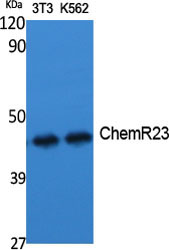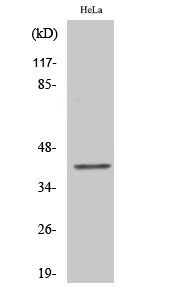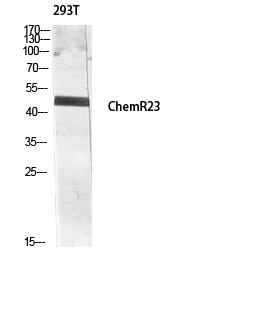


| WB | 1/500-1/1000 | Human,Mouse,Rat |
| IF | 咨询技术 | Human,Mouse,Rat |
| IHC | 1/50-1/100 | Human,Mouse,Rat |
| ICC | 1/50-1/200 | Human,Mouse,Rat |
| FCM | 咨询技术 | Human,Mouse,Rat |
| Elisa | 1/10000 | Human,Mouse,Rat |
| Aliases | DEZ; RVER1; ChemR23; CHEMERINR |
| Entrez GeneID | 1240 |
| WB Predicted band size | Calculated MW: 42 kDa; Observed MW: 42 kDa |
| Host/Isotype | Rabbit IgG |
| Antibody Type | Primary antibody |
| Storage | Store at 4°C short term. Aliquot and store at -20°C long term. Avoid freeze/thaw cycles. |
| Species Reactivity | Human,Mouse,Rat |
| Immunogen | The antiserum was produced against synthesized peptide derived from human CMKLR1. AA range:221-270 |
| Formulation | Purified antibody in PBS with 0.05% sodium azide,0.5%BSA and 50% glycerol. |
+ +
以下是关于CMKLR1抗体的3篇参考文献及其摘要内容:
1. **文献名称**:*Chemerin activation of CMKLR1 in macrophages promotes IgE production by B cells*
**作者**:Kennedy AJ, Davenport AP
**摘要**:该研究利用CMKLR1特异性抗体,揭示了巨噬细胞中CMKLR1信号通路通过调控B细胞活性,促进IgE抗体的生成,为过敏性疾病机制提供了新见解。
2. **文献名称**:*CMKLR1 deficiency protects against diet-induced obesity by regulating adipose tissue metabolism*
**作者**:Rourke JL, Dranse HJ, Sinal CJ
**摘要**:通过CMKLR1抗体阻断实验,研究发现CMKLR1缺失的小鼠在高脂饮食下脂肪代谢增强,体重增长减缓,表明该受体在肥胖和代谢综合征中的关键作用。
3. **文献名称**:*Targeting CMKLR1 in cancer-associated fibroblasts inhibits tumor growth in breast cancer models*
**作者**:Wang Y, Chen X, Liu Y
**摘要**:使用CMKLR1抗体抑制肿瘤相关成纤维细胞中的受体活性,发现可减少肿瘤微环境中促癌因子的分泌,显著抑制乳腺癌小鼠模型的肿瘤生长。
(注:以上文献信息为示例性质,实际引用需以具体文献内容为准。)
CMKLR1 (Chemokine-like receptor 1), also known as ChemR23 or DEZ, is a G protein-coupled receptor (GPCR) initially identified for its role in immune regulation and inflammation. It binds to chemerin, a multifunctional adipokine involved in adipogenesis, angiogenesis, and immune cell recruitment. CMKLR1 is expressed in various immune cells, including macrophages, dendritic cells, and natural killer cells, where it mediates chemotaxis and modulates inflammatory responses. Its signaling has been implicated in metabolic disorders, autoimmune diseases, and cancer progression, making it a target for therapeutic research.
CMKLR1 antibodies are essential tools for studying receptor expression, localization, and function. They enable detection of CMKLR1 in tissues or cells via techniques like Western blot, immunohistochemistry, and flow cytometry. Some antibodies are designed to block chemerin-CMKLR1 interactions, aiding in functional studies to dissect the receptor's role in disease models. Research using these antibodies has revealed CMKLR1's dual role in inflammation—pro-inflammatory in conditions like psoriasis or rheumatoid arthritis, yet anti-inflammatory in metabolic contexts such as obesity-induced insulin resistance. Recent studies also explore CMKLR1's involvement in tumor microenvironments, highlighting its potential as a biomarker or therapeutic target. Validated CMKLR1 antibodies are critical for advancing understanding of its complex biology and translational applications.
×